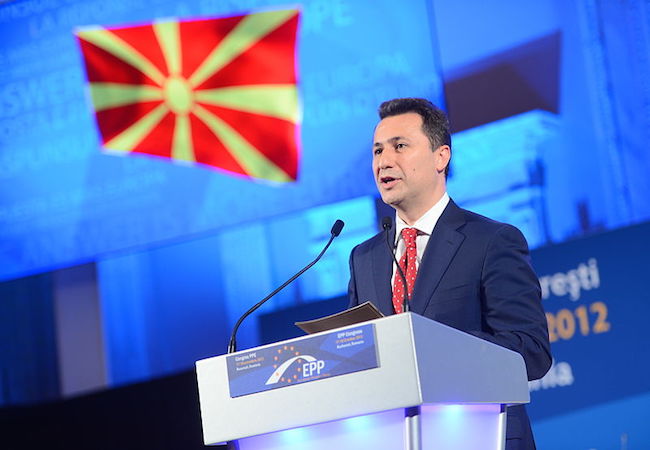
By Sinisa Jakov Marusic, BIRN
The opposition alleged that wiretapped conversations reveal the premier’s direct involvement in a political deal to amnesty suspects in four war-crimes cases from Macedonia’s 2001 conflict.
The opposition Social Democrats presented covertly-recorded tapes on Monday that they said proved that PM Nikola Gruevski personally agreed an amnesty in the four war-crimes cases related to alleged atrocities committed by ethnic Albanians.
The Social Democrats’ leader Zoran Zaev said Gruevski had made the deal as part of negotiations for the formation of a new government with an Albanian party, the Democratic Union for Integration, DUI, after elections in 2011.
“This will tear off his [Gruevski’s] favourite mask, the one of his patriotism,” Zaev told a press conference, the opposition’s 18th in recent weeks on the subject of government wiretapping.
The taped conversations purport to reveal how Gruevski first admits to his party colleague, MP Silvana Boneva, that he has just agreed an amnesty for the cases with DUI leader Ali Ahmeti and then instructs Boneva that the motion must be voted on in parliament “in one week’s time”, before the formation of the new government.
“I choose to deal with it now. We should deal with the negative stuff now,” the Gruevski is apparently heard telling Boneva, adding that any ruling party statement on the amnesty must be tailored to sound suitably neutral and not damage his image as a patriot.
The four cases date back to the 2001 armed conflict between the Macedonian security forces and Albanian insurgents, whose leaders later formed the DUI party.
The International Criminal Tribunal for the Former Yugoslavia (ICTY) took over jurisdiction of five war-crimes cases from Macedonia in 2002, the year after the conflict, but returned an indictment in only one.
The other four were sent back to Macedonia in 2008, and the public prosecutor’s office initially said it would re-examine them.
But in a controversial move, the ruling coalition led by Gruevski’s VMRO DPMNE party voted in July 2011 to abandon the four war-crimes cases. At the time, Gruevski insisted he had nothing to do with the decision and that it was not part of a political deal with the DUI to join his government.
Further tapes appear to reveal that Interior Minister Gordana Jankuloska, albeit unwillingly, acts as one of the main players in the attempt to push the amnesty bill through parliament quickly.
In one conversation, Gruevski’s advisor Biljana Briskovksa appears to inform Jankuloska that recommendations by the UN Committee Against Torture “exclude amnesty” for the four cases and that the ICTY has recommended that they be processed in local courts. But Jankuloska gives instructions that this fact be hidden in the vague text outlining the government’s opinion on the subject.
“Let them [parliament] do it, they know what to do and let them do it. But it should not come from us,” the voice purported to be that of Jankuloska says.
Further tapes apparently reveal Gruevski giving instructions that his VMRO DPMNE MPs and ministers who are still formally MPs must immediately appear for the parliament session so that there is a quorum for the amnesty bill that is bound to be highly unpopular among the ethnic Macedonian majority.
They also allegedly reveal Jankuloska and Finance Minister Zoran Stavreski admitting they have made false excuses not to appear at the parliament session, despite being under immense pressure to show up and vote.
Both appear to express discontent that they are being pressed to vote while some of their colleagues, including Gruevski, are probably outside the country.
“[Vice Prime Minister Vladimir] Pesevski is 100 per cent somewhere on a beach in Greece,” the voice alleged to be that of Stavreski says, to which Jankuloska replies: “The same goes for the boss [Gruevski].”
Zaev started releasing the tape recordings of alleged conversations of government figures in February.
He claims that Gruevski and his cousin, secret police chief Saso Mijalkov, have orchestrated the illegal surveillance of some 20,000 people, and insists the material comes from sources in the Macedonian secret services.
But Gruevski has insisted that the tapes were created by unnamed “foreign secret services” in collaboration with the opposition in order to destabilise the country.
In one of his latest addresses to his supporters, Gruevski accused Zaev of “high treason”.
Gruevski’s VMRO DPMNE party said on Monday that the tapes relating to the war crimes cases were not genuine and that Zaev’s allegations were untrue.
“Zoran Zaev continues to manipulate using fabricated and false materials put in a context that suits him in order to create confusion among citizens,” the party said in a statement.
“With these press conferences, he is only confirming that the eavesdropping has been done by outsiders under the patronage of foreign centres. His role is to be a tool of the foreign centres that have the goal of disrupting Macedonia’s stability and harming its international reputation,” it said.




